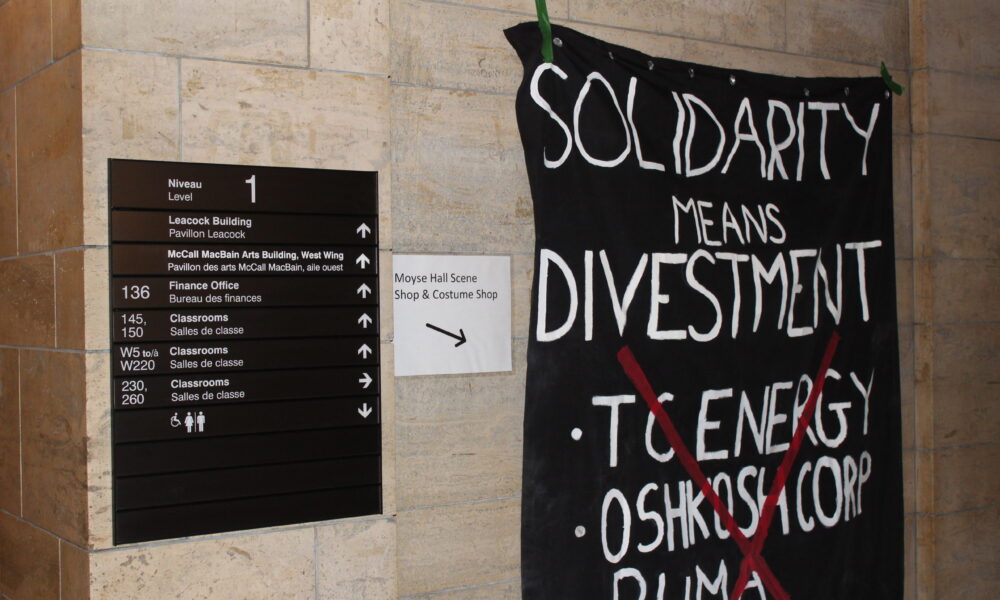Divest McGill members and organizers arrived at the McCall MacBain Arts Building around 1:30 p.m. on March 7. It was the start of their minimum one-week-long occupation in protest of McGill’s continued investments in the fossil fuel industry. According to their manifesto, Divest is calling for a complete overhaul of what they say is a university system built on white supremacy and settler-colonialism, run by a Board of Governors (BoG) that serves capitalist interests.
“We could not think of a better place to symbolically show McGill that we want to build a grassroots movement for democratization,” said Jordan,* a member of Divest, in an interview with The McGill Tribune inside the Arts building. “The Arts building is one of McGill’s most iconic buildings, especially from the outside. [We] want to demonstrate to the McGill community and the Montreal community as a whole that we will not stand for McGill to continue doing what they have been doing.”
In order to raise awareness about McGill’s approximately $50 million directly invested in the oil and gas industry, Divest is handing out pamphlets and flyers with information about police brutality, RBC’s investment in the Coastal GasLink (CGL) pipeline, as well as information about past Divest occupations and actions. Among the handouts is Divest’s manifesto, which specifically calls on the university to divest from the CGL pipeline and to democratize their governing bodies.
Members of Divest are planning to stay overnight in tents set up in the main entrance of the Arts building. In addition to their 24-hour presence, they have organized several events to engage students in the fight for divestment and the democratization of the BoG and Senate. Movie screenings, community dinners, and open discussions on topics ranging from anarchism to Indigenous rights are slated to take place in the Arts building from March 8 to 11.
According to Zahur Ashrafuzzaman, U2 Cognitive Science and member of Divest, the Arts occupation is also a way for Divest to stand in solidarity with several organizations pushing back against McGill, such as the Association of McGill University Support Employees (AMUSE) and the Mohawk Mothers. Several banners hung in the main Arts corridor call on McGill to divest from TC Energy, the company currently building pipelines through unceded Wet’suwet’en territory.
Jordan emphasized that the occupation being conducted by Divest is open to all members of the McGill community. Ashrafuzzaman added that accessibility was a priority.
“For so many people, McGill just does not feel safe in so many ways: We have the blacklist of Palestinian students, we have McGill restraining the use of harm reduction by floor fellows to actually keep students safe,” Ashrafuzzaman said in an interview with the Tribune. “So many people are put in a precarious situation because of McGill [….] So, we want to have somewhere that feels radically safe and radically full of care.”
Within the first couple hours of the occupation, Divest caught the attention of many passers-by. Students and McGill staff stopped regularly to ask questions about what was going on and staying longer to learn more about the divestment movement. Linden MacKenzie, U1 Environment and Development at the Bieler School of Environment, was heading to her class in Leacock when she was handed a pamphlet.
“I feel proud to be a part of the student community here because obviously they care a lot,” MacKenzie said in an interview with the Tribune. “[I’m] not so proud to be a part of McGill as an institution that does not divest from fossil fuels.”
After reading the various handouts and visiting the resources on Divest’s social media, MacKenzie was all the more dismayed by McGill’s inaction. She plans to attend several upcoming events Divest has organized to show her solidarity with their pursuit.
“How can [McGill] not understand the impact of fossil fuels?” MacKenzie said.
*Jordan’s name has been changed to preserve their anonymity
A previous version of this article quoted Zahur Ashrafuzzaman saying “we have floor fellows at the whim of being fired by McGill and losing housing.” In fact, floor fellows are not at the whim of being fired or losing housing, and the issue revolved more around McGill’s harm reduction policies. The Tribune regrets this error.










